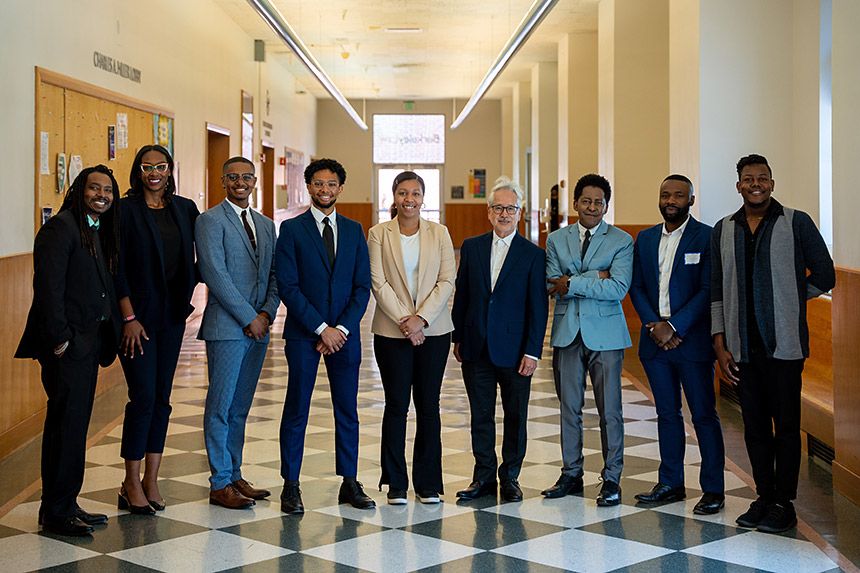
By Andrew Cohen
Those who lead the Berkeley Journal of Black Law & Policy know the subject can get heated and divisive. But they see reparations, the focus of the journal’s recent 30th anniversary symposium, as more logical development than pie-in-the-sky wish.
“It’s a contentious topic, as are many that involve race,” said Editor-in-Chief Alexis Tatum ’25. “But that’s not a reason to shy away from it. It’s not that crazy an idea in our legal system to atone for past wrongs. That’s what the law is regularly used for.”
Senior Symposium Editor Dominick Williams ’25 proposed the topic. He worked with California Secretary of State Shirley Weber as a liaison to the California Reparations Task Force — the first such unit created nationwide in 2020 — to study and develop reparation proposals for African Americans, especially descendants of people enslaved in the United States.
“The badges of slavery are vestiges of a system that never really ended,” Williams said. “They therefore complicate and enrich conversations about what reparations could look like.”
Journal Historian and Communications Editor Alyssa Young ’25 created the program for the symposium, which included attorneys, scholars, and task force members who discussed its work and outlined arguments for reparations — as well as hurdles to achieving them.
The task force held 16 public meetings and spent over two years studying and developing proposals. Its 1,100-page report submitted in June 2023 included 115 recommendations addressing areas such as political disenfranchisement, housing segregation, separate and unequal education, mental and physical harm, and the wealth gap. Multiple reparations bills were recently introduced in the California State Legislature.
Detailing the reparations movement’s history, task force Chair Kamila Moore described the first time a slave petitioned the U.S. government for redress, broader reparations efforts after the Civil War, and William Patterson and Paul Robeson charging the U.S. with genocide, as it was defined, before the United Nations in the 1950s.
“They made the case for African Americans, arguing that killing members of the group, causing serious bodily and mental harm, deliberately inflicting psychological harm, and forcibly transferring children of the group to other groups all took place,” Moore said.
She cited recent studies showing that white households on average own nine times more assets than Black households, California is America’s sixth most segregated state in schooling, and Black people are highly overrepresented in foster care, juvenile proceedings, arrest and conviction rates, and more.
Powerful backlash
Western Center on Law and Poverty Director of Policy Advocacy Brandon Greene addressed the growing pushback against corporate ESG (environmental, social, governance) measures, critical race theory, and other steps designed to counteract institutional racism.
“Right here in California, doctors are suing over mandatory anti-bias training despite widespread racial disparities across our healthcare system,” he said. “We’re seeing a current attack on everything racial equity and racial justice. After the killing of George Floyd (by Minneapolis police) in 2020, corporations made promises about racial justice, but subsequently have been rolling those back … A lot of discourse about a racial reckoning that wasn’t.”
Task force member Don Tamaki ’76 was on the pro bono legal team that reopened the 1944 Supreme Court case Korematsu v. United States, regarding the internment of over 120,000 Japanese Americans during World War II. Now senior counsel at Minami Tamaki, he called reparations opposition disappointing but not surprising.
“At least 37 states have adopted new measures that limit how America’s system of racism is taught and there are over 100 bills about what teachers can teach about race,” he said. “But the fact is, when it comes to race, America has been truth-challenged since its inception.
“I wondered how anti-Japanese hate could cause all three branches of government to fail so spectacularly, and I viewed it as a stand-alone example. I was wrong. I now view it as a subchapter of racial pathology that began with anti-Black animus and easily morphed to target other people of color too.”
The task force identified five areas of California-specific harm for reparations: incarceration and over-policing, housing segregation, unjust property taking, health harms, and devaluation of Black businesses.
“We’re not recommending that California give money to Black Americans, we’re recommending that it return money to Black Americans,” Tamaki said. “The cost of not reckoning with what has happened is far more costly than the cost of reparations. Society is paying for this every day in housing, healthcare, and more.”
Cavernous concerns
Southwestern Law Professor Kevin Greene, an entertainment and IP law expert who represented top artists before entering academia, discussed inequality in copyright law and African-American music. Unpacking how Jelly Roll Morton, Little Richard, Irene Cara, and other famous Black musicians wound up destitute, he pointed to the system’s archaic registration requirement and unequal royalty fees.
“Copyright and contract law are the perfect storm for black exploitation,” says Greene, who testified before the task force in 2021 on reparations in the entertainment industry. “Common law contracts were designed by the British aristocracy to protect themselves and we have the same system here. It was never designed to protect people at the bottom. The Copyright Office is supposed to protect all artists, not just Warner Bros., Sony, and EA Sports. Black people built the American music industry yet they’ve gotten so little out of it.”
Greene also warned against equating reparations with donations to Black causes, which corporations widely made after Floyd’s death. “That’s not reparations, that’s a handout,” he said. “Reparations is money that’s owed and due, not because you’re in the mood.”
Drawing on insights from the work of Chicago Torture Justice Center and legal scholar Boris Bittker, Seton Hall Law Professor Ndjuoh MehChu advised that reparations for police violence could be a worthwhile pursuit under 42 U.S. Code Section 1983, a civil rights law passed during Reconstruction to address Ku Klux Klan violence. He proposed that when cities are found liable for excessive force under the statute, liability should include a court-ordered apology to the victim and the city paying extra-compensatory damages to victims who are indirectly harmed by police violence, such as bystanders.
Cameron Clark, supervising attorney at Berkeley Law’s Policy Advocacy Clinic, stressed the importance of individual civil claims joining broader policy efforts, saying the law of restitution and unjust enrichment needs more attention.
“If someone is unjustly enriched at the harm of another, restoring the harmed person to their previous position is a matter of fairness,” he said. “Defendants don’t have to show culpability — you could inadvertently gain an advantage and still have to make it right. It’s not giving money to someone, it’s restoring money or property to someone wronged.”


